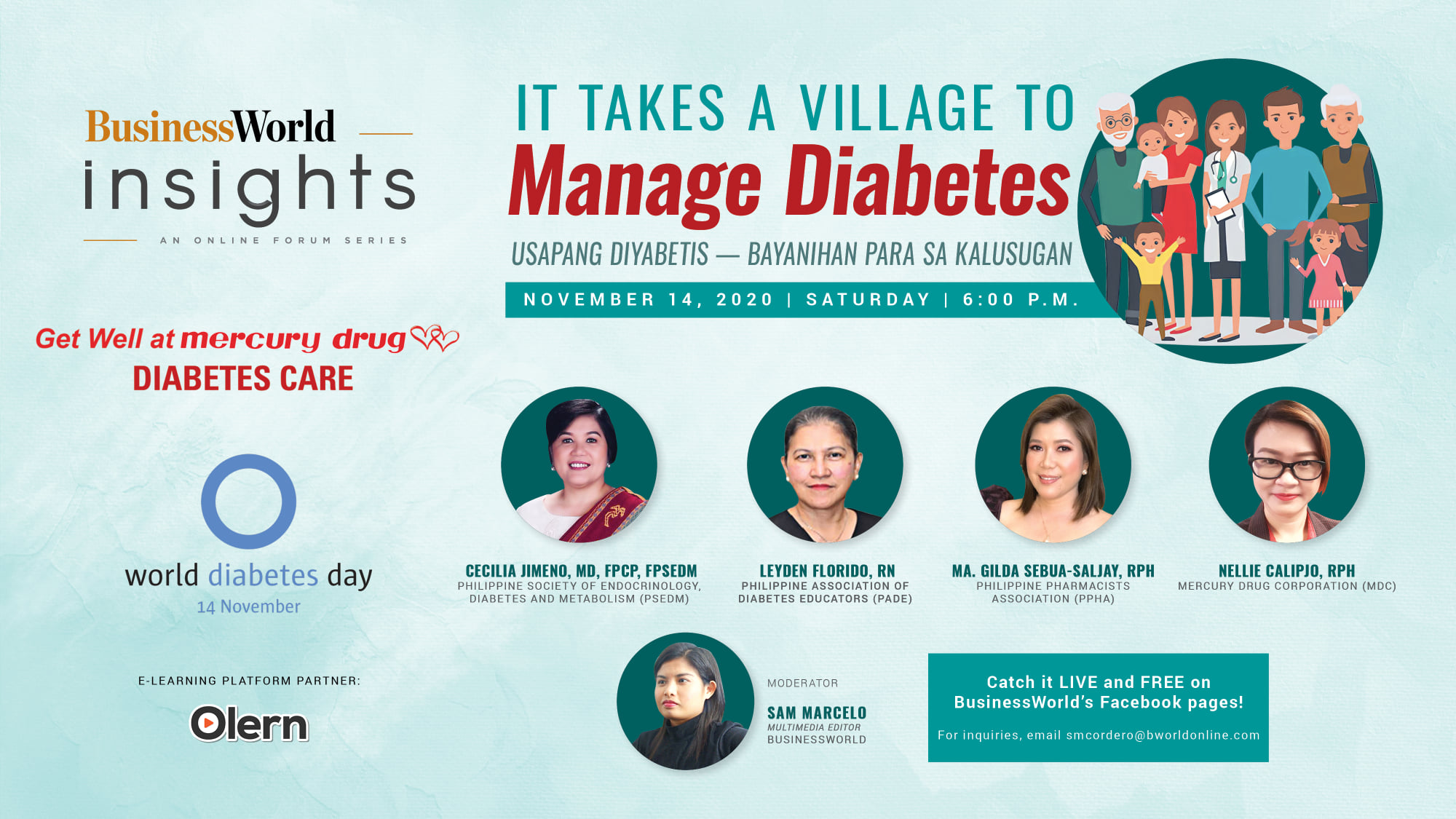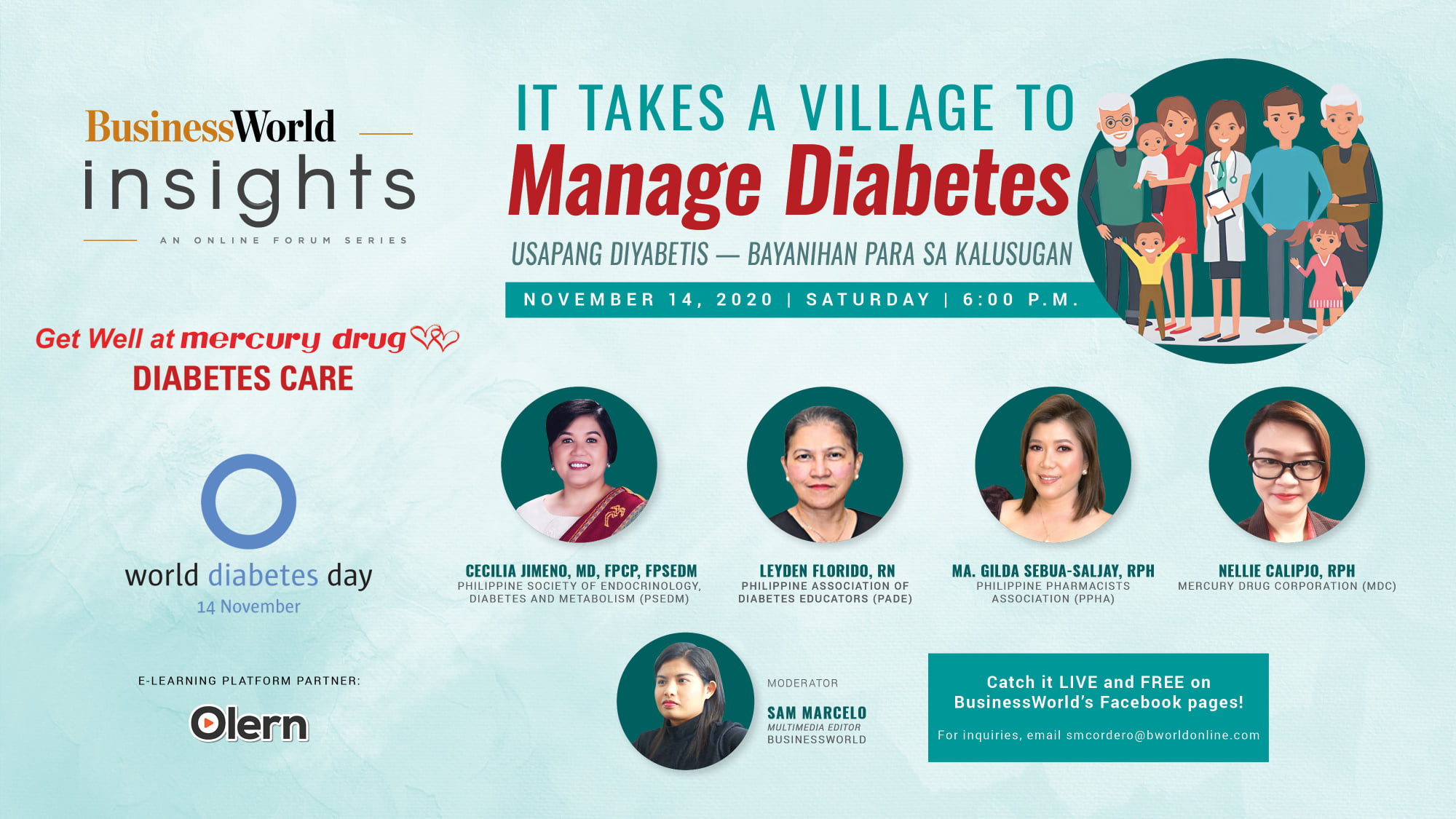What crucial roles do patients and health professionals play in diabetes management?
With diabetes remaining as one of the leading causes of death among Filipinos, it is vital for patients to have constant access to quality healthcare and information. At the same time, many should be made aware of this chronic disease and of how it can be diagnosed and prevented.
Achieving these goals requires strong collaboration among patient and their families, health professionals, and government agencies. As highlighted in a recent BusinessWorld Insights online forum, held in partnership with Mercury Drug Corporation and health care company MSD in the Philippines, interprofessional collaboration among physicians, nurses, pharmacists, and other healthcare professionals is likewise vital in managing diabetes.
Dr. Cecilia Jimeno, FPCP, FPSEDM of the Philippine Society of Endocrinology, Diabetes, and Metabolism (PSEDM), discussed the burden of diabetes on persons who already have it or might have it if the disease is not yet diagnosed. She stressed that diabetes, or having a long-term or chronically elevated blood sugar, poses a great burden because its symptoms do not show until blood sugar reaches a very high level.
Even if the symptoms are many —which include frequent urination, waking up thirsty, itchiness, ants swarming in toilet after urination, blurring of vision, numbness, and wounds that do not heal up very quickly— a greater majority of people with diabetes do not experience symptoms in the first place, Dr. Jimeno said.
This makes screening very important, especially when one has risk factors, such as age (with older ones more prone to developing the disease), family history, lack of physical activity, being overweight or obesity, and even diseases like tuberculosis or lupus. Moreover, gestational diabetes and polycystic ovary syndrome (PCOS) are also risk factors of women. “If you have just one risk factor, you can already have yourself screened,” explained Dr. Jimeno.
She also emphasized that among families with history of diabetes, there should be determination among members not just to get screened but also to prevent diabetes by adopting healthy lifestyles such as avoiding smoking and sugary beverages.
In addressing diabetes, face-to-face consultation is usually the immediate action. With the pandemic making it difficult to hold such interactions, telemedicine comes as a helpful alternative even if many still prefer face-to-face. This insight was shared by Leyden Florido, a nurse and diabetes educator who also serves as president of the Philippine Association of Diabetes Educators (PADE).
“Technology is important during this pandemic, but our doctors, nurses, nutritionists, pharmacists, dietitians are there to help them,” Florido added.
Sharing the same train of thought, Dr. Jimeno shared that telemedicine can be as effective as face-to-face in spite of its limitations. “If done well, in cooperation with the patient and their family, it can be very effective,” she said, adding that she has observed some of her patients were able to improve their sugar level even through telemedicine consultations. For those who might not be able to access this digital channel, she encourages using other means of communication, such as telephone call or online messaging for consultations to proceed.
Aside from continuing consultations, proper adherence to management of diabetes is crucial for patients with diabetes, Florido pointed out. “We have to facilitate your treatment and we are going to explain why you need that,” she advised patients in adhering to how their doctors manage their condition, which she noted does not only involve medications but also proper nutrition, exercise, as well as preventing stress.
Pharmacists’ role in diabetes care
In addressing the prevalence of diabetes in the country, pharmacists also play a crucial part in helping patients deal with diabetes.
Ma. Gilda Sebua-Saljay, RPh, president of the Philippine Pharmacists Association, shared that pharmacists have three roles in managing diabetes— in terms of treatment, health promotion, and collaboration with health care professionals. “During this pandemic, more than ever, pharmacists are the most accessible healthcare professionals in the community,” Sebua-Saljay said.
“Pharmacists in the drugstores or in the community setting are the community-based knowledge resource health practitioners,” she added, “and we can help patients understand the dangers of chronic diseases [like diabetes] and the importance of prevention.”
As the country’s leading pharmacy chain, Mercury Drug Corporation (MDC) is helping patients manage the treatment of diabetes through their programs and advocacies. MDC’s Nellie Calipjo, RPh shared that a major program they have implemented in this regard is the “Get Well at Mercury Drug – Diabetes Care” specialty hubs, a one-stop-shop section in some Mercury Drug branches dedicated to the needs of patients with diabetes. “We are proud to say that our specialty hub has been recognized as a first in the retail or community pharmacy industry,” Calipjo said.
“A lot of pharmacists in Mercury Drug were trained by experts from PSEDM and PPhA to improve how they counsel and guide certain customers on all relevant aspects of diabetes management,” explained Calipjo.
To date, there are 29 “Get Well at Mercury Drug – Diabetes Care” specialty hubs nationwide, and MDC plans to add more of these to reach more patients frequenting their stores.
Progress in diabetes treatment and prevention
As the world moves forward from the current pandemic, the panel expressed their hope that diabetes management will further improve, especially with stronger collaboration from various fields and sectors.
“All the technology is here, and in the near future, with the introduction of Universal Health Care in the Philippines, our government will start to pay for outpatient services. Even the consultations will gradually be paid for by the government,” Dr. Jimeno said.
Moreover, Florido also emphasized the need to put more focus on prevention and advocacy to mitigate the burden of diabetes to patients and their families.
Lastly, Calipjo shared that MDC is leveraging its digital channels to spread awareness on diabetes and reach more people who can benefit from reliable information. “We believe that a well-informed patient can better manage or control his or her diabetes,” she said.

